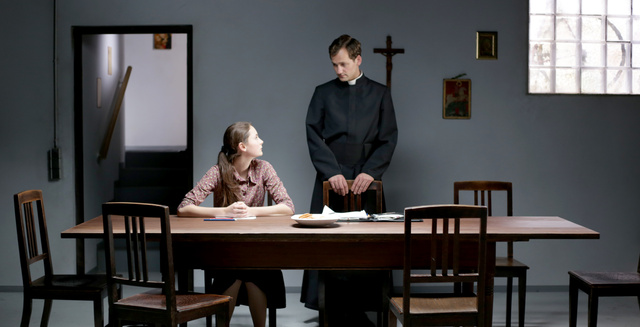As mentioned in my earlier EIFF round-up, one of my hot picks at this year’s Edinburgh International Film Festival was winner of the Silver Berlin Bear for Best Script and the Prize of the Ecumenical Jury: Stations of the Cross. It’s a frank but insightful look at the impact religious fundamentalism can have on a family, and charts the journey of a young girl, Maria, as she heads towards her first communion and explores just what it means to be closer to god.
**Some spoilers below **
At first glance, it sounds painfully religious and I did have my doubts about it. Anything with a religious flavour to it always tends to make me feel a bit uncomfortable, but I have to say I was pleasantly surprised by the uniqueness of the film. It’s particularly tangible and raw in its execution, serious and poignant, yet also interspersed with just enough humour to make it an enjoyable view as opposed to merely a watchable one.
Shot in 14 segments, the film implements a lot of single take sequences and the formulaic, but well divided scenes really help to convey the progression of Maria’s journey from impressionable teen to devout religious fanatic. It’s an odd sort of thing really, to be looking at something so markedly influenced by religion, yet also find it detached. It could be considered a social commentary in many respects, but one of the things I found particularly insightful about the film was the way in which Maria’s family’s devotion to their strict off-branch order of Catholicism, was just how normal the rest of their lives were. Religion was a large part of it, but not the entirety and considering some of the subject matter later on – I thought this was particularly humanising, especially in respect to Maria’s decision to sacrifice herself to God.
Having watched Stations of the Cross the sum total of three times, I kept finding something new on each watch, as it’s such a multifaceted story with a lot of inferences and intricacies that you can look into along the way. I thought I’d hate it, but it actually became one of my favourite films of the festival – so naturally when I was also given the opportunity to put a few questions to director Dietrich Brüggemann, I jumped at the chance!
What drew you to the idea of making a film with such a strong religious focus?
It just happened. There’s lots of reasons, but those reasons are really only justifications, later additions to something that you basically feel needs being done. When we grew up, we had some contact with that catholic extremists the film deals with, so we basically knew what it was all about. But we didn’t start by saying: Alright, let’s tackle religion, how could we do it, what elements might we put together? The idea of using the 14 stations and that kind of story just came, first thing, and that was the actual reason for doing the film.
Did you face any particular challenges when filming? Notably with things like directing the younger actors during such single sequence shots?
That’s of course a challenge, but those long shots are also a huge liberation. On a normal film set, you have a small bubble of people focused on the actual making of the scene, mostly the director, DoP, sound guys, and of course the actors, while there’s a huge buzz of other people around you, handling gear and things and stuff. And those two realms tend to not go well with each other. You always have to defend that little calm focus zone. And in addition, you’re always in a hurry. All this is quite different when you do just one long setup per shooting day. That intimate zone extends, it covers the whole set, it draws everone in, and everyone on the crew is emotionally and in a way even spiritually engaged in getting the scene right. Maybe it’s a bit like everybody singing in a choir. And that’s a huge help, especially for the young actors, but also for the more experienced ones.
What kind of research did you need to do in order to explore the dynamic of religion and the devout belief of something so fundamental? Was there any consciousness there of conveying devout Catholicism in a sensitive way, considering the extent to which Maria opts to follow it?
Not much research. We knew the large part from our own childhood. The society of St. Pius X. run a huge website where you can find all kinds of stuff. The sermon that bishop delivers at confirmation draws heavily from a sermon by the actual archbichop Lefebvre, that I found there and just altered the words a bit. And we really tried to be fair and thoughtful about religion. When you think about what religion is ultimately about, matter of fact, set aside all the theological voodoo, what I see is people gathering in a church, singing hymns, playing the organ, going about their rituals, and maybe most important, forming a community where they share their everyday lives, get in touch and support each other. I feel that’s an incredibly valuable thing, and I would never raise my voice against it.
I particularly liked the way such serious subject matter is interspersed with elements of comedy, from maths problems being used as flirting, through to the satanic influence of jazz. Did you think this was important to help show the normality in which Maria’s family lives, despite their devout religious bias?
I guess there’s two kinds of comedy. One is the actual comedy as in theatre and comedy films, where every character has some kind of comical view on the world, mostly emphasising one aspect and blowing that hugely out of proportion. We laugh as we see ourselves like in a fun house mirror, so to speak, and we might even gain some insights through that exaggerated versions of ourselves. The other kind is the quieter one, that draws from just depicting the absurdities of everyday life. This film is of course no comedy, but does encourage some angles that might be funny. Many films right now, especially on the festival circuit, go to considerable lengths to rule out any viewpoint that might appear funny. I didn’t. It’s a complex thing, and “complex” means there’s more than one way of seeing things. One is the tragic perspective, another is the funny, both are true. Actually I have a strong feeling of truth in films that occurs in these special moments, where you have pain and tragedy and comedy in one place.
What’s next for you? Are there any more projects we can look forward to in the future?
That will be an actual comedy, one of the exaggerated kind. It deals with neo-nazis in Germany. “Four Lions” is of course an obvious reference, only we’re trying to gain a wider scope, making a film not only about a bunch of skinheads, but rather about a whole society that is too stupid, in all its parts to come to terms with a bunch of stupid neo-nazis. When I started writing I felt “nobody is gonna finance this in Germany”, but now it might actually be happening. Ask me in a couple of months and I’ll know if it worked.
Stations of the Cross was at Edinburgh Film Festival 2014 and will be released in the UK later on in the year.



